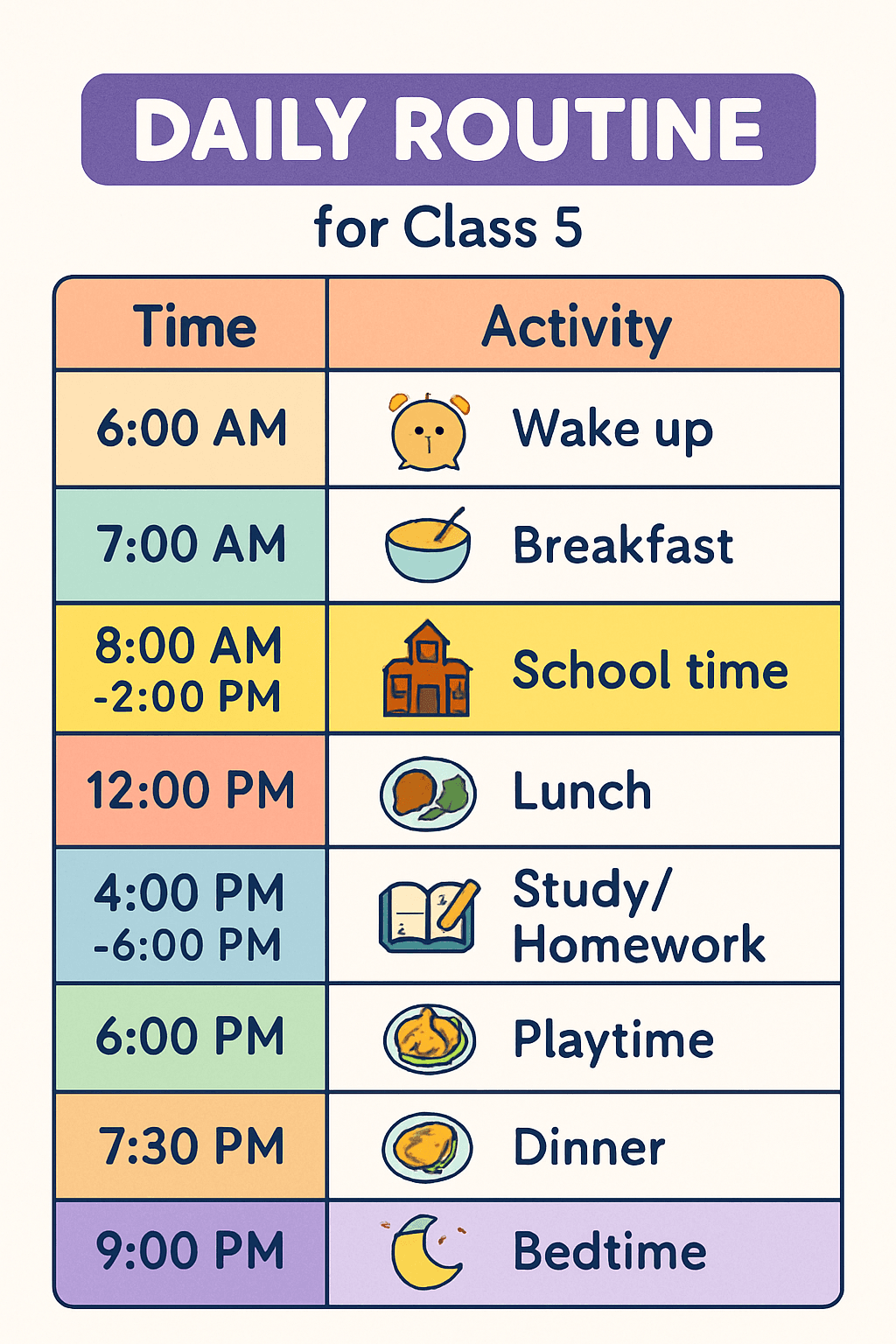A Must Have 24-hours Daily Routine

“Early to bed, early to rise makes a person healthy, wealthy, and wise.” You must have heard this line many times, right? But do we really follow it? For students, building good habits and following a proper daily routine is very important. At this age, children are curious, full of energy, and need the right balance between studies, playtime, and rest.
In this blog, we’ll explore a 24-hour daily routine for students that keeps them healthy, happy, and productive.

24-Hour Daily Routine for Students
A good routine gives students the right balance between studies, play, rest, and personal growth. Let’s look at a simple daily chart that Class 5 students can easily follow.
Morning Routine (6:00 AM – 8:00 AM)
1. Wake Up Early (6:00 AM):
Starting the day early gives students extra time for learning and activities. Waking up at 6 makes the body fresh and the mind active.
2. Freshen Up (6:00 – 6:30 AM):
Brushing teeth, washing the face, and taking a quick bath prepares students to feel clean and refreshed for the day ahead.
3. Exercise / Yoga (6:30 – 7:00 AM):
Light exercise such as stretching, yoga, or cycling keeps the body healthy and active. Just 20–30 minutes is enough to boost energy.
4. Healthy Breakfast (7:00 – 7:30 AM):
Breakfast fuels the brain for school. Milk, fruits, eggs, or parathas give the strength needed for the day.
5. Quick Revision (7:30 – 8:00 AM):
A short review of homework or reading a storybook warms up the brain before heading to school.
School Time (8:00 AM – 2:00 PM)
Pay Attention in Class: Listen carefully, take notes, and ask questions.
Lunch Break (12:30 PM): Eat healthy food from home and avoid junk food.
Group Learning: Share ideas with friends—peer learning is powerful.
By 2:00 PM: School ends and students return home.
Afternoon Routine (2:00 PM – 5:00 PM)
1. Lunch at Home (2:00 – 2:30 PM):
A balanced meal with dal, rice, vegetables, or chapati restores energy after school.
2. Rest / Nap (2:30 – 3:30 PM):
A short nap relaxes the body and mind, preventing evening tiredness.
3. Homework Time (3:30 – 5:00 PM):
Finishing homework early avoids stress later and helps students stay disciplined.
Evening Routine (5:00 PM – 8:00 PM)
1. Playtime (5:00 – 6:00 PM):
Outdoor games like cricket, badminton, or cycling keep students strong, happy, and social.
2. Snacks (6:00 – 6:15 PM):
A healthy snack like fruits, milk, or sandwiches recharges energy.
3. Study / Reading Time (6:30 – 7:30 PM):
Evenings are perfect for focused learning—revising school lessons, solving maths problems, or practicing grammar.
4. Personality Development Activities (7:30 – 8:00 PM):
This is the time to build life skills beyond academics.
PlanetSpark offers storytelling, communication, and public speaking sessions that boost confidence and creativity. For students, these sessions are fun yet powerful in shaping personality and future success.
Night Routine (8:00 PM – 10:00 PM)
1. Dinner with Family (8:00 – 8:30 PM):
Eating together strengthens family bonds and encourages good manners.
2. Relaxation / Creative Time (8:30 – 9:00 PM):
Activities like drawing, music, puzzles, or storytelling help relax the mind.
3. Next Day Prep (9:00 – 9:15 PM):
Packing the school bag and keeping the uniform ready avoids morning stress.
4. Bedtime Story / Reading (9:15 – 9:45 PM):
Storybooks spark imagination and improve language skills. Parents can also narrate short stories.
5. Sleep (10:00 PM):
Students need at least 8–9 hours of sleep for proper memory, growth, and concentration.
Example of a 24-Hour Daily Routine for students

Why Do Students Need a Routine?
Discipline
Following a routine trains students to be punctual and responsible. When they make a habit of doing things on time, this discipline not only improves their studies but also shapes their personal life as they grow older.
Time Management
A routine helps children understand the value of time. With a fixed schedule, they know when it’s time to study, play, or rest. This makes them more organized, reduces stress, and prevents last-minute rush.
Balanced Growth
Children need a healthy mix of activities. Too much study can cause fatigue, while only playing can affect learning. A routine ensures they get a fair share of study, fun, and relaxation—supporting their all-round growth.
Confidence
Completing homework and daily tasks on time gives students a sense of achievement. Each small success boosts their self-confidence and motivates them to stay consistent and aim higher.
Healthy Habits
A routine creates positive habits like sleeping on time, eating meals regularly, and exercising. These habits improve focus, energy, and overall well-being, making students sharper both in the classroom and in daily life.
Benefits of Following This Routine
Improves concentration and academic performance:
When students follow a routine, their mind gets used to studying at fixed times. This consistency improves focus and helps them understand lessons better, leading to higher academic performance.
Balances physical activity and studies:
A routine ensures children get enough time for both learning and play. This balance keeps their mind sharp, body active, and avoids boredom from only studying.
Reduces stress during exams and homework:
When tasks are done on time every day, students don’t have to rush before exams or deadlines. This reduces anxiety and makes learning a smoother process.
Encourages healthy eating and sleeping habits:
Eating meals on time and sleeping early helps children stay active and fresh. These habits boost memory, energy, and overall well-being.
Builds responsibility, confidence, and time management skills:
Completing daily tasks like homework, chores, or preparation for the next day teaches responsibility. Students feel confident when they manage their time well and meet their goals.
Adds personality development through platforms like PlanetSpark:
Along with schoolwork, PlanetSpark’s courses in communication, storytelling, and public speaking help students express themselves better. This adds confidence, creativity, and leadership qualities to their personality.
Tips for Parents
- Encourage children to follow the routine but don’t force too much. Flexibility is important.
- Provide a quiet and clean study space.
- Limit screen time (TV, phone, or video games).
- Enroll kids in personality development programs like PlanetSpark for confidence and communication skills.
- Motivate with small rewards for discipline (like extra storytime or a favorite snack).
- Be a role model like- when parents follow routines, children copy them naturally.
How School Hours Shape Learning and Social Skills
School is not just about books and exams and it’s where children learn teamwork, communication, and problem-solving. Following a daily routine makes them attentive in class, disciplined during activities, and cooperative with teachers and peers. Students who are regular in their routine also find it easier to complete assignments and actively participate in group projects.
By combining school learning with PlanetSpark’s personality development programs, children not only perform well academically but also grow into confident leaders who can handle challenges inside and outside the classroom.
How PlanetSpark Helps Kids in Personality Development
Communication Skills: Practice speaking clearly through storytelling, roleplay, and interactive conversations.
Confidence Building: Presenting stories and participating in sessions boosts self-esteem and comfort in group settings.
Creativity: Encourages imaginative thinking through storytelling, problem-solving, and creative exercises.
Social Skills: Teaches teamwork, empathy, and polite communication in group activities.
Critical Thinking: Develops observation, analysis, and decision-making through discussions and scenario-based exercises.

Conclusion
Childrens are in important stage in a student’s life. They are not too small but not yet in higher classes, so this is the best time to build discipline, good habits, and time management. A proper 24-hour daily routine helps students stay energetic, perform better in studies, and also enjoy their childhood with play and creativity.
Adding personality development courses through PlanetSpark gives them an edge in communication, storytelling, and leadership skills. Parents should guide their children in following this routine, but remember, flexibility is key. Every child is unique, so adjust timings as per comfort. With balance, discipline, and confidence, students will grow into happy and successful learners.
Frequently Asked Questions
1. Can PlanetSpark help implement this daily routine for students?
Yes, PlanetSpark offers live sessions in communication, storytelling, and personality development that complement a 24-hour routine, making learning more structured and engaging.
2. How can parents track their child’s routine effectively?
PlanetSpark provides progress reports and session updates, helping parents monitor learning, creativity, and confidence alongside daily routines.
3. Are PlanetSpark courses suitable for Class 5 students?
Absolutely. PlanetSpark designs programs specifically for children in grades 3 to 8, ensuring age-appropriate personality and communication skill development.
4. Can students join PlanetSpark online while following this routine?
Yes, PlanetSpark’s online classes are flexible, allowing students to attend short, interactive sessions without disrupting study, play, or rest schedules.
5. Do PlanetSpark sessions improve academic performance too?
While focused on communication, storytelling, and personality, these sessions also enhance confidence, focus, and creative thinking, which indirectly support better academic performance.
6. How often should students attend PlanetSpark classes for maximum benefit?
Regular weekly sessions, ideally 2–3 times a week, help students consistently build confidence and personality skills without overwhelming their daily routine.
7. Can PlanetSpark customize learning based on individual student needs?
Yes, PlanetSpark mentors personalize sessions based on each child’s skill level, learning pace, and interests, ensuring maximum engagement and growth.
Download Free Worksheets
Personalized Communication Report
Record a video to get a AI generated personalized communication report for your child

Hi There, want to try these
tips for your child with
LIVE with our expert coach?
Let's check your child's
English fluency

